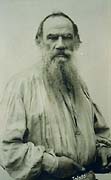
| RUSSIAN LITERATURE IN TRANSLATION (FLR 303) |

| Syllabus | Requirements |
| Course content | Links |
| Course Materials | Contact Information |
|
FLR 303 - Leo TOLSTOY. WAR & PEACE MW 3:00 - 4:15 G110 Caldwell Hall Fall 2015 G110 Caldwell Hall Email: vlad_bilenkin@ncsu.edu MWF 10:45-11:15 am MW 1:30-2:00 pm or by appointment Video recordings of my lectures. Course content
Usual class format will include mini lectures, student reports on their reading and discussion. Students will be required to read a number of critical and historical sources related to the novel as well as view and screen some visual materials. Students will be responsible for assigned readings (averaging 100 pages per week), taking notes and participating in class discussions. Readings, lectures, and discussions in English. Student Learning Outcomes Upon completion of this course the student will learn to: - recognize the ways in which the reading and interpretation of Tolstoy's novel can deepen their knowledge and understanding of human existence and modern world; - distinguish between the views or perspectives within the novel, those of its author, characters and one's own; - infer concepts or ideas from concrete literary representations; - outline and discuss the main themes of Tolstoy's work by using conceptual language (rather than everyday speech; - describe how main characters change throughout the novel and discuss this change in relation to Tolstoy's religious and philosophical views; - identify major existential, social, and philosophical questions raised by Tolstoy or implicitly contained in the novel; - outline Tolstoy's philosophy of history and describe its relation to the Russian and European ideological contexts. - relate the existential, social and philosophical themes of the novel to present times. RequirementsWhile this course targets students with no or little knowledge of Russian and world literature and has no prerequisites, it is nevertheless a 300-level course and expects a certain level of sophistication in understanding, thinking, arguing, and adequately expressing oneself, both in speech and writing. To put it less vaguely, students taking this course are assumed to be aware of the general progression of European political and cultural history, if only on a very basic level, be prepared for controversies and ambiguities. This is a course for students who love to read and talk about literature and human experience. The first and foremost requirement is keeping up with the reading schedule. Reading quizes will be given regularly and account for 20% of the final grade. A typical reading quiz will include ten questions designed to determine whether the student has read the assigned chapters closely enough. These quizzes will be graded as Passed or Failed. Ten points will be deducted for each wrong answer. Four wrong answers out of ten = Failed. Midterm and Final exams in the form of short essays or/and answers -- 30% + 30%. I will decide later on the format of these tests. There will be home assignments other than reading, usually in the form of a brief report on selected historical and cultural topics relevant to the novel. Home assignments and class participation (includes contributions to the discussion board) - 20%. Attendance policy Attendance and full participation in classes and examinations is expected of all students except audits. I may request to provide documentation for multiple consecutive class absences or frequent single class absences. Ordinarily, no make-up is provided for missed in-class activities. In the event of an excused absence, students may arrange with me for make-up work. The NCSU rules for excused absences will apply.
SYLLABUS Weekly reading assignments must be completed by the first class of the following week. Week 1: W&P. Preface (vii - ix). Leo Tolstoy: A Chronology (1183). "Some Words about War and Peace" (1089 - 1096). Book One (3 - 94). To be read in this order. Wiki articles on: Leo Tolstoy, The Decembrist Revolt, Alexander I of Russia, Napoleon Bonaparte. Week 2: W&P. Book Two (95 - 173). Feuer (1142 - 1147). Wiki on Napoleonic Wars. Week 3: Book 3 (175 - 255) Wiki article on The Battle of Austerlitz.
Wiki on The Treaties of Tilsit. Week 5: Book 6 and 7 (367 - 474)
Wiki: French Invasion of Russia. Week 8: Book 10 (607 - 730). Gustafson (1148 - 1156).
Suggested readings: Strakhov (1101 - 1107). Turgenev (1107 - 1108). Leontiev (1109 - 1110)
Week 15: Discussions. Final Exam
Course Materials Leo Tolstoy. War and Peace (Norton Critical Edition, 1996). On sale at the University Book Store. Links Illustrations to War and Peace by I. K. Rudakov
War and Peace (a nice online version from friends and partners) |